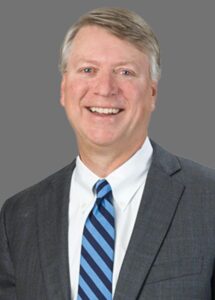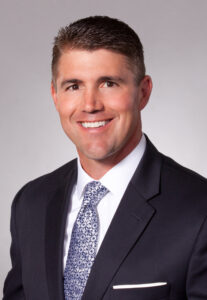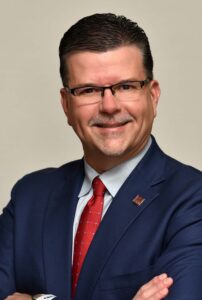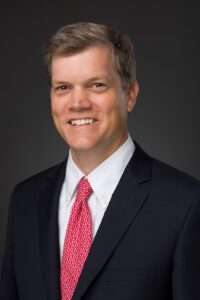Writer: Liz Palmer
 4 min read December 2022 — Invest: recently sat down with community banking leaders to discuss the role they play in the Triangle’s economic resiliency, especially in times of uncertainty. Across the board, these executives shared how their unique ability to be nimble in relationship building, problem solving and community impact gives them confidence that community banking models will always be a crucial piece of a community’s continued success.
4 min read December 2022 — Invest: recently sat down with community banking leaders to discuss the role they play in the Triangle’s economic resiliency, especially in times of uncertainty. Across the board, these executives shared how their unique ability to be nimble in relationship building, problem solving and community impact gives them confidence that community banking models will always be a crucial piece of a community’s continued success.
John Sprink, Market President, HomeTrust Bank
Market President of HomeTrust Bank John Spring believes banking and lending are personal, and each market served should be treated independently based on its needs. “We continue to see a high level of job growth and in-migration here in the Triangle. That localized approach is why I’ve gravitated toward working with a community bank. HomeTrust has the capacity to finance large transactions and build deep meaningful relationships through our broad array of products and services,” he said. “Equally or even more important, we’re fortunate to have knowledgeable clients and smart, experienced bankers who ask the right questions and have the ability to make local decisions. I believe we’re doing a good job of supporting our local economies.”
As the banking sector continues to navigate a new chapter, some financial institutions are breaking off to see what works best for them instead of sticking to a single industry approach. “The industry is at a crossroads in terms of trying to homogenize and provide a lot of technology-based decision-making. Nonetheless, lending is still a subjective practice. AI will get stronger in terms of algorithms over time but I think it still misses the human factor,” he said. That’s where the community banking model comes in. “We’ve worked with our clients for a long time and it’s a little hard to accept that an algorithm with a bunch of inputs will automatically provide the right output. There are some intangibles that you see when sitting with a client, learning about their experience, hearing the passion and seeing their vision. One of the questions we like to ask is, ‘what keeps you up at night?’ That’s a great question to ask a client. We need to come up with solutions to help them. The ease of doing business is what people want. It’s about being responsive to your customers. If you’re shipping something off for the decision-making by a third party, clients lose the human element. Ultimately, it is about listening, caring and being responsive to our client’s needs.”
 Brian Reid, President, TowneBank Triangle
Brian Reid, President, TowneBank Triangle
“Banks are a critical part of the capital structure of our communities. We want to continue to serve everybody, from the smallest businesses to the bigger corporations,” said Brian Reid, president of TowneBank Triangle. Operating in a state named an ideal place to do business while interest rates rise, making home buying and other investing more challenging, Reid believes community banks have an opportunity. “Our role is for the community to continue to be able to make those investments so we can grow and thrive. Sadly, we have about one seventh of the residential real estate inventory that we need to meet demand from the community. We will continue to make the required investments on our end to increase this segment.”
Consolidation shows no signs of slowing in the financial sector, but according to Reid, that doesn’t necessarily mean community banks will become obsolete as a result. “At the peak of banking some many years ago, we had over 16,000 banks across the country. We have less than 5,000 now,” he said. “But regardless of the industry, there is always going to be a need for a community bank. Just by sheer size and focus, community banks can have a more intimate relationship and be far nimbler compared to a much larger banking experience. Of course, huge banks are always going to be necessary because huge corporations need that type of horsepower. In the same breath, the owner-operator business with $5 million in sales locally needs someone to be their advocate. We do not feel community banking is going anywhere. We will continue to see consolidation in banking, but we will also see new startups as time goes by.”
Earl Worley, President & CEO, KS Bank
“Community banks are vital to communities, especially in rural and urban markets,” said President and CEO of KS Bank Earl Worley. His priority is preserving community banking for future generations to ensure communities’ financial wellbeing. “We are seeing the ‘WalMart effect’ of larger banks arriving, dissolving a community bank and potentially creating a negative community impact by taking away the option to bank locally. Community bankers understand the markets better than anyone else – because we are in our communities, we know our people’s businesses and are able to help how we can more flexibly.” KS Bank is responding with an expansion strategy as a result. “We recently expanded to Dunn in Harnett County because another local community bank left and residents wanted our presence. Because of this demand, I see a bright future ahead for community banks,” he said.
 Adam Currie, Chief Banking Officer, First Bank
Adam Currie, Chief Banking Officer, First Bank
Specifically for rural communities, community banks have proven a vital resource in access to financial literacy resources. This is a focus for First Bank, its Chief Banking Officer Adam Currie said, especially in recent years. “Our team has done a great job focusing on financial literacy and education. We have long felt that, as a community bank, the best thing we can do is to reinvest in our community. Several years ago, we did not have a strategic direction for giving back to our communities. In 2020 we launched The Power of Good. We have put most of our philanthropic and marketing dollars in this initiative. This year, we started Project Launch within the Power of Good. Project Launch is helping fund ideas and initiatives to improve education as well as recognizing Out of This World Educators across the Carolinas. We put $500,000 toward funding educational ideas, we celebrated educators, we gave away hundreds of books and more. I’m proud of the impact we are making.”
According to Currie, the next chapter of banking is happening right now, and business is shifting. “The volatility of interest rates is something many business owners don’t understand, particularly the impact this will have over the next few years,” he said, which has triggered a concerted effort to thwart any associated challenges. “We want to be consistent for customers and provide useful advice. You will continue to see lending across the spectrum, between mortgages, business lending and corporate lending, change significantly over the next year. The economic environment is changing quickly and I don’t like the business of making predictions, but it looks like 2023 will be challenging for everyone.”
For more information, visit:

